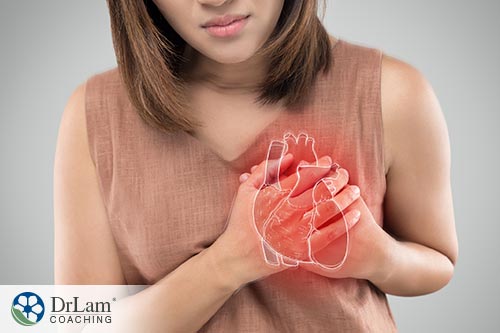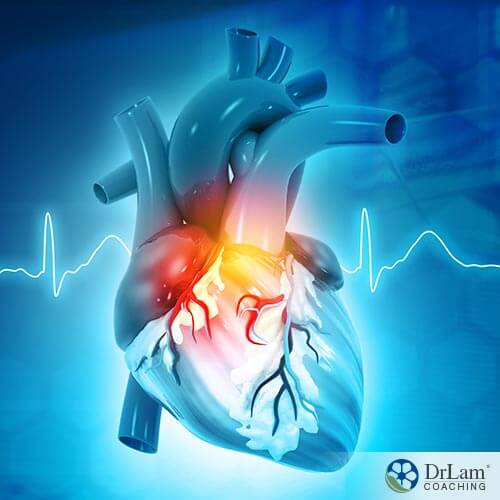 Have you ever felt that you have missed or additional heartbeats or felt your heart pounding or racing? These are all indications that you are having heart palpitations. Palpitations refer to your awareness of an irregular, fast, powerful, fluttering, or unusual heart rate. Your normal heart rate ranges between 60-100 heartbeats per minute. The heart palpitations vary from excessive awareness of normal variations in heart rate to serious heart conditions and can be felt over the chest, neck, and throat.
Have you ever felt that you have missed or additional heartbeats or felt your heart pounding or racing? These are all indications that you are having heart palpitations. Palpitations refer to your awareness of an irregular, fast, powerful, fluttering, or unusual heart rate. Your normal heart rate ranges between 60-100 heartbeats per minute. The heart palpitations vary from excessive awareness of normal variations in heart rate to serious heart conditions and can be felt over the chest, neck, and throat.
Heart palpitations are usually benign. However, if accompanied by other symptoms such as sweating, lightheadedness, fatigue, anxiousness, difficulty concentrating, then your adrenals may be a factor. You must understand the causes of heart palpitations, the interlinked involvement of body systems, and what remedial measures can be taken.
Heart palpitations can be due to several causes, which can be placed in two categories:
Palpitations can occur if there is a defect in the structure or functioning of your heart. The structural defects comprise abnormal musculature or valves of the heart. The functioning of the heart consists of the pumping action which supplies blood to the body organs. Studies reveal that the cause of palpitations was cardiac in 43%, psychiatric in 31%, miscellaneous in 10%, and unknown in 16%. There was a high rate of recurrence of symptoms and a moderate impact on productivity in work performance and tasks at home in patients with palpitations.
You can also get palpitations due to the following non-heart related causes:
 The Cardionomic Circuit is a triad and consists of the cardiovascular system (CVS) involving heart, adrenal glands and, the sympathetic nervous system. The three systems and organs work in collaboration to handle the stress.
The Cardionomic Circuit is a triad and consists of the cardiovascular system (CVS) involving heart, adrenal glands and, the sympathetic nervous system. The three systems and organs work in collaboration to handle the stress.
In the conditions of mild stress, the first responder in this interlink is the HPA axis, starting at the hypothalamus in the brain and ending at adrenals which release cortisol. When stress rises, the adrenal glands cannot handle it alone, resulting in falling cortisol output and Adrenal Fatigue Syndrome (AFS). This triggers the autonomic nervous system (ANS) which leads to spike in the levels of norepinephrine and epinephrine, leading to an imbalance in your body manifesting as CVS dysfunction such as dizziness, blood pressure, heart rate irregularity, and heart palpitations.
Excessive norepinephrine is also known as a reactive sympathetic overtone (RSO). Excessive epinephrine may lead to a faster heart rate and ultimately arrhythmia. It is also called reactive sympathetic response (RSR). RSR and RSO, both also known as adrenaline dominance, are both parts of the same continuum. RSR tends to be more serious and more advanced in symptomatology as compare to RSO. People can have both independently or concurrently. This can make the clinical condition quite convoluted. A full cardiac workup must be performed to make sure no other underlying causation. if you have been given a clean bill of heart health, it's time to consider nonstructural causes of palpitation frequently experienced in adrenal fatigue. Palpitations in general terms, therefore, can occur in both RSO and RSR scenarios.
The activation of the systems involved in the causation of heart palpitations is progressive and depends on the level of stress. This means that when the stress is mild, all components of the triad are not completely activated. Only the adrenal glands may activate, or only the sympathetic nervous system may activate. However, as stress increases, your condition can worsen as all systems and organs kick in. Your heart, adrenal glands, and sympathetic nervous system all respond and symptoms arise.
Therefore, a cautious approach must be followed to address the issue under the guidance of a health coach. A detailed history along with consideration of all factors affecting your lifestyle will be carefully reviewed to evaluate your condition. The root cause of the imbalance of your body will then be determined by your health coach. When the root cause is identified, you can then systematically work to resolve it for long term health and healing.
In the short term, it is also important to manage the symptoms as much as possible as well. This can involve stress reduction techniques, meditation, calming supplements, and many other modalities.
One great tool is deep breathing. Heart palpitations in an AFS setting are often triggered by excessive stimulatory neurotransmitters and hormones such as norepinephrine and epinephrine. Enhancing the parasympathetic tone to offset sympathetic tone is an important step in reducing heart palpitations. Proper breathing can be help offset sympathetic tone and help with palpitations. Breathing is a very powerful tool to increase the parasympathetic response in your body to be able to override the sympathetic response that goes on during stress. It's important to be in a calm state of breathing.
Your body has to be allowed to slowly metabolize and clear existing toxic agents such as anti-stress hormones and reactive species. To facilitate this process, remove all external stimulants such as caffeine, nicotine, and energy drinks which can lead to palpitations. Avoid certain drugs that have a stimulatory effect on the heart such as cold medications, excess thyroid replacement therapy, weight reduction medications, amphetamines, illegal drugs such as cocaine. Medications such as sleeping pills, antidepressant medications, and anti-arrhythmic medications have to be carefully titrated, if possible. Stimulatory supplements can also affect your Cardionomic Circuit and lead to heart palpitations as well.
 Your heart muscles have to relax to decrease firing speed and raise the filling time of the heart to increase the output of blood for bodily functions. You can try relaxation techniques, such as meditation or deep breathing. However, too much exercise must be avoided since that can reduce adrenaline clearance from the body as adrenaline increases during vigorous exercise. You must focus on core gentle exercises such as adrenal yoga that can support the relaxed state of the body.
Your heart muscles have to relax to decrease firing speed and raise the filling time of the heart to increase the output of blood for bodily functions. You can try relaxation techniques, such as meditation or deep breathing. However, too much exercise must be avoided since that can reduce adrenaline clearance from the body as adrenaline increases during vigorous exercise. You must focus on core gentle exercises such as adrenal yoga that can support the relaxed state of the body.
Your adrenal glands must not be overstimulated so that the cortisol output balances itself. If metabolic heart stimulants such as CoQ10, carnitine, and hawthorn, are used, they must be titrated. Avoid stimulatory herbs including licorice, ashwagandha, maca, and green tea. Even vitamin C and B can be problematic. There is a time and place for every supplement, but you have to know how and when to use it. Those with adrenal fatigue can be very sensitive to any supplement, so they must be careful to not just try supplements without knowing the purity or the right dosage for their body. Please find a qualified health care practitioner to help you with your personalized regimen.
Many supplements can calm the body, but must be used judiciously. GABA, melatonin, 5-htp, valerian, magnesium, passionflower, etc, are just some of the supplements that can help you relax. Taking these at the wrong time, however, may present with paradoxical reactions if not careful. This happens frequently in those with advanced adrenal fatigue. The weaker the body, the greater the risk of paradoxical reactions.
The internal balance has to maintained to restore the normal functioning of your body. This involves keeping electrolytes stable, especially sodium and potassium, maintaining blood volume up by hydrating well and avoiding temperature fluctuation.
The cornerstone of the remedy is to avoid the worsening of your condition. Modern medicine can be life-saving but it focuses on the management of symptoms. This is in contrast to the natural measures which suggest alleviation of the cause of the problem.
Some measures to improve heart palpitations include:

It is highly essential to understand that your body is fragile. Any sudden change in diet, lifestyle, or medications can worsen your symptoms. Therefore, please seek advice from your healthcare practitioner who will assess your overall state and recommend the optimal choices for you.
If you would like to get additional information or need assistance with palpitations, the team at Dr. Lam Coaching can help. We offer a free** no-obligation phone consultation at +1 (626) 571-1234 where we will privately discuss your symptoms and various options. You can also send us a question through our Ask The Doctor system by clicking here.
Heart palpitations are not only caused by the malfunctioning of the heart or a defect in the heart's structure. They are also caused by an imbalance in different body systems working together to maintain a normal state. So a careful approach is needed to address the cause of heart palpitations.
